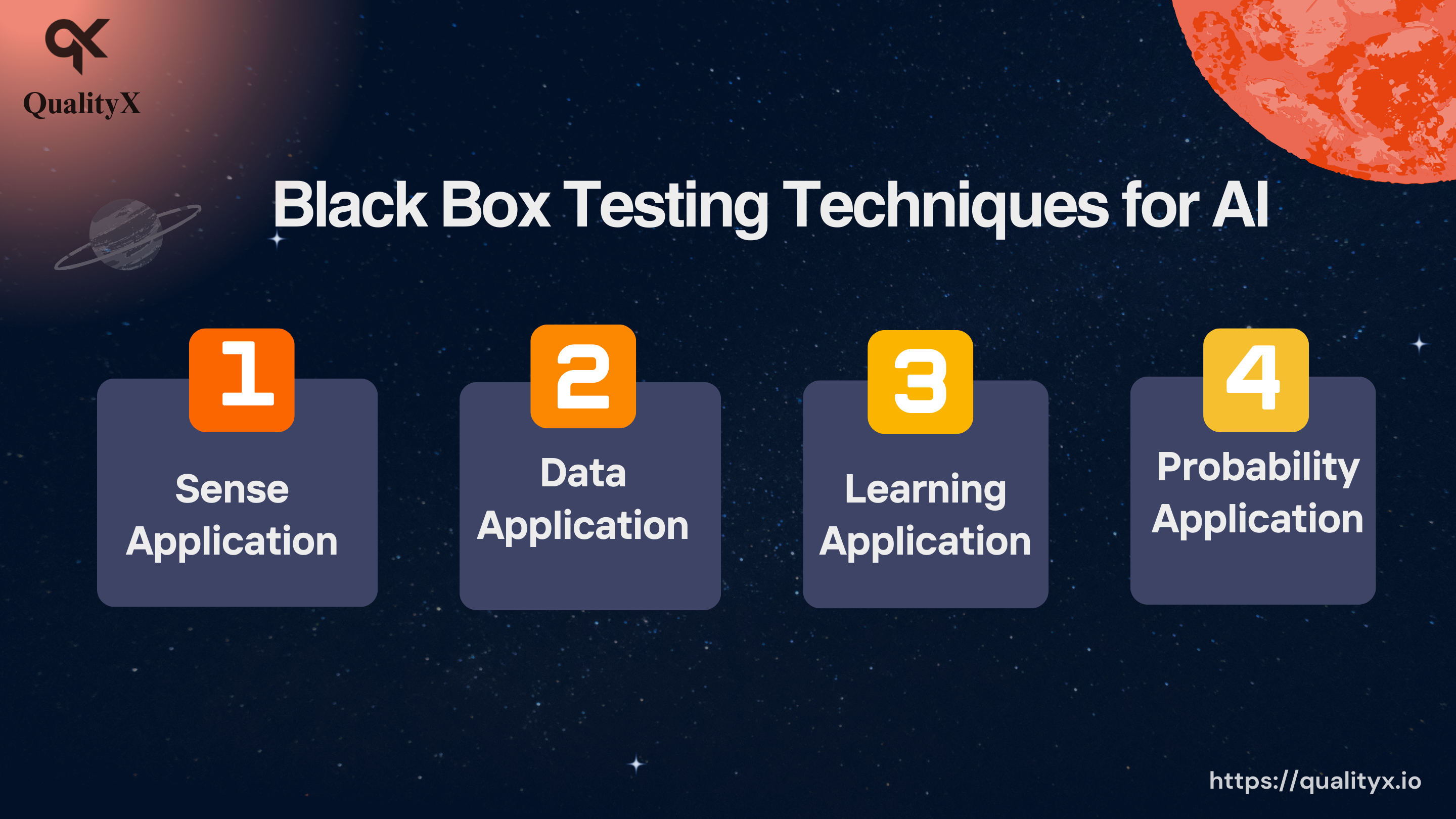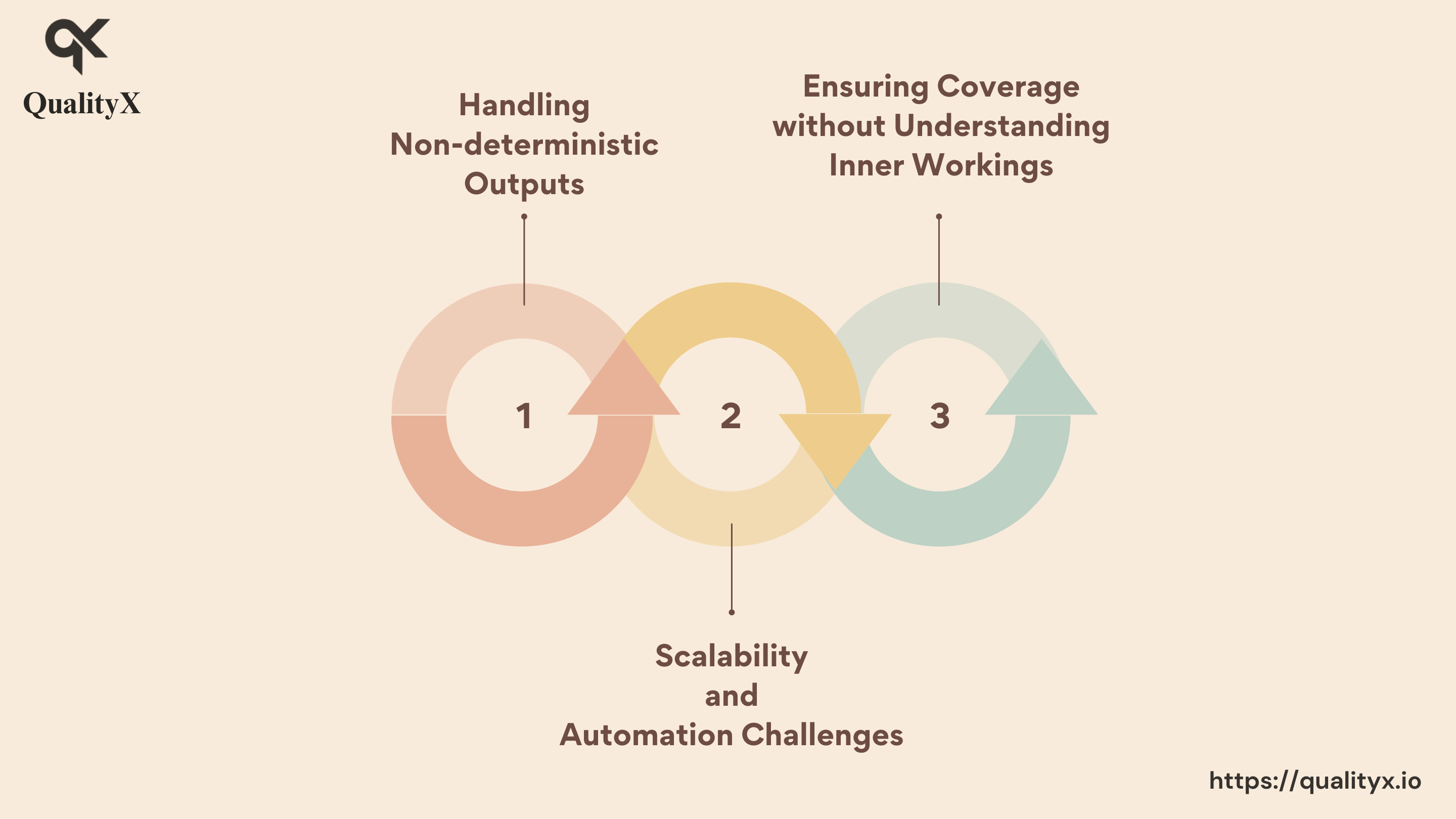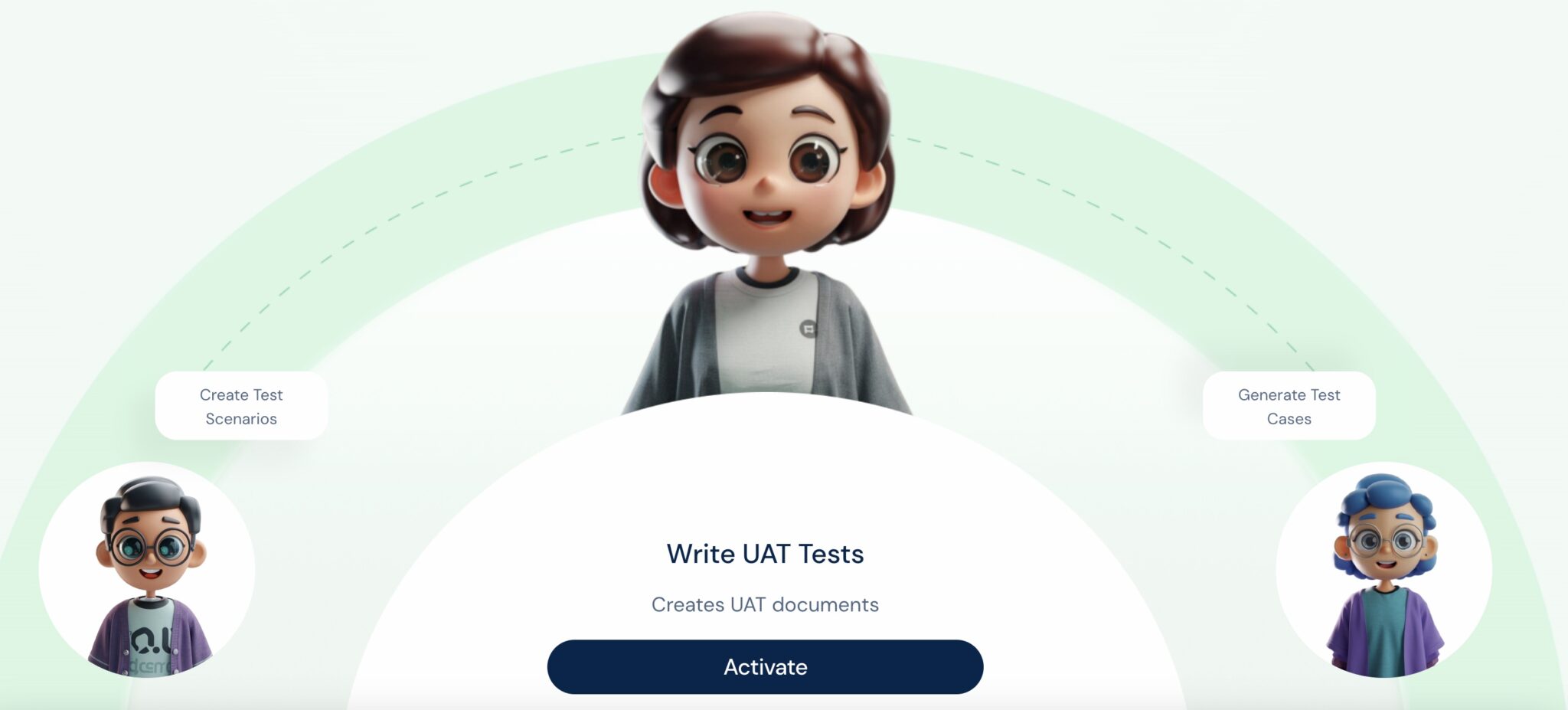Introduction
- In today’s dynamic and ever-evolving digital landscape, businesses are constantly seeking ways to enhance their applications and stay ahead of the curve.
- This document provides an in-depth understanding of the significance of Black Box Testing in the context of AI systems and outlines key principles to ensure effective testing.
The Significance of Black Box Testing for AI:

- AI systems are dynamic and complex, often exhibiting unexpected behaviors.
- Many users lack the expertise to comprehend AI algorithms, focusing on results rather than algorithms.
- The AI market is expanding rapidly, necessitating a streamlined and dependable testing process.
Black Box Testing Techniques for AI:

Black Box Testing Techniques for AI
- Sense Application:
- Simulate AI logic outcomes in real-world scenarios.
- Fine-tune control variables to improve accuracy and consistency.
- Simulate AI logic outcomes in real-world scenarios.
- Data Application:
- Select test data that covers a wide range of scenarios.
- Comprehensive test data ensures AI systems’ adaptability across various industries.
- Select test data that covers a wide range of scenarios.
- Learning Application:
- Gain an in-depth understanding of AI functionalities to generate effective test cases.
- Utilize neural networks to evaluate the accuracy of AI outputs.
- Gain an in-depth understanding of AI functionalities to generate effective test cases.
- Probability Application:
- Implement Fuzzy Logic to classify test cases.
- Maximize regression testing coverage to ensure AI systems excel in real-world scenarios.
- Implement Fuzzy Logic to classify test cases.
Key Principles of Effective Black Box Testing for AI Systems:
- Comprehensive Test Scenarios:
- Diverse scenarios ensure the versatility of AI systems across different industries.
- AI systems refined through comprehensive Black Box Testing often stand out in the market.
- Diverse scenarios ensure the versatility of AI systems across different industries.
- Creating Test Cases Reflecting Real-World Use:
- Test cases should mirror real-life scenarios to meet user needs.
- User-focused testing ensures the dependability of AI solutions in practical situations.
- Test cases should mirror real-life scenarios to meet user needs.
- Balancing Randomness and Representativeness:
- Random testing reveals unforeseen issues.
- Representativeness ensures AI systems are prepared for typical scenarios.
- A balanced approach equips AI systems for both expected and unexpected challenges.
- Random testing reveals unforeseen issues.
- Continuous Feedback and Iteration:
- AI development is an iterative process, and Black Box Testing should reflect this dynamism.
- Incorporate feedback loops into testing to refine AI systems continually.
- Test scenarios should evolve with system upgrades to maintain consistent performance.
- AI development is an iterative process, and Black Box Testing should reflect this dynamism.
- Independence of Testing Teams:
- Independent QA testers bring fresh perspectives and often identify issues developers might overlook.
- Maintaining a clear distinction between development and testing processes upholds the objectivity of Black Box Testing.
- Independence ensures unbiased evaluations, contributing to the robustness of AI systems.
- Independent QA testers bring fresh perspectives and often identify issues developers might overlook.
- Usability and Accessibility Focus:
- Prioritize user experience (UX) in Black Box Testing to ensure AI systems provide more than just functionality.
- Emphasize accessibility to ensure AI systems cater to a diverse user base, from tech enthusiasts to novices.
- Test AI interpretability and explanations to bridge the gap between AI and users.
- Prioritize user experience (UX) in Black Box Testing to ensure AI systems provide more than just functionality.
- Ethical and Unbiased Evaluation:
- Proactively identify and rectify biases in AI systems to safeguard brand reputation.
- Employ advanced tools and techniques to address biases and promote fair AI deployments.
- Rigorous Black Box Testing ensures AI solutions uphold ethical standards, including safety, security, transparency, and explainability.
- Proactively identify and rectify biases in AI systems to safeguard brand reputation.
Common Challenges in Black Box Testing for AI:

Common Challenges in Black Box Testing for AI
- Handling Non-deterministic Outputs:
- AI systems often produce non-deterministic outputs, creating challenges for consistent testing.
- Probabilistic approaches that incorporate various possible outputs enhance testing accuracy and realism.
- AI systems often produce non-deterministic outputs, creating challenges for consistent testing.
- Scalability and Automation Challenges:
- AI systems often operate at a scale that exceeds manual testing capabilities.
- To address this, implement scalable and automated testing processes, including unit testing, integration testing, and end-to-end testing.
- Automation ensures comprehensive test coverage and frees human resources for higher-level analyses.
- AI systems often operate at a scale that exceeds manual testing capabilities.
- Ensuring Coverage without Understanding Inner Workings:
- Black Box Testing aims to assess functionality without deep knowledge of internal operations.
- Adopt a scenario-driven testing approach by creating diverse test scenarios that explore various facets of AI behavior.
- Collaboration between AI experts and testing professionals ensures rigorous evaluation.
- Black Box Testing aims to assess functionality without deep knowledge of internal operations.
Conclusion:
- Black Box Testing is indispensable for AI systems to guarantee their robustness, ethical integrity, and usability.
- Embracing the principles of comprehensive testing, real-world scenarios, feedback-driven iteration, and ethical evaluations ensures reliable and ethical AI systems.
aiTest: A Closer Look
aiTest an all-in-one testing platform. This platform is designed to conduct comprehensive testing on your applications concurrently. It supports cross-browser and browser version testing, as well as functional and performance tests integrated with Analytics. Additionally, the platform incorporates automation features, including an LLM for effortless generation and testing of machine learning models and generating test data for the same.One-stop solution for continuous testing, integrating seamlessly with CI/CD pipelines. With support for multiple languages and specialized testing for AI/ML services, aiTest empowers organizations to speed up their release cycles while ensuring quality and reliability.


